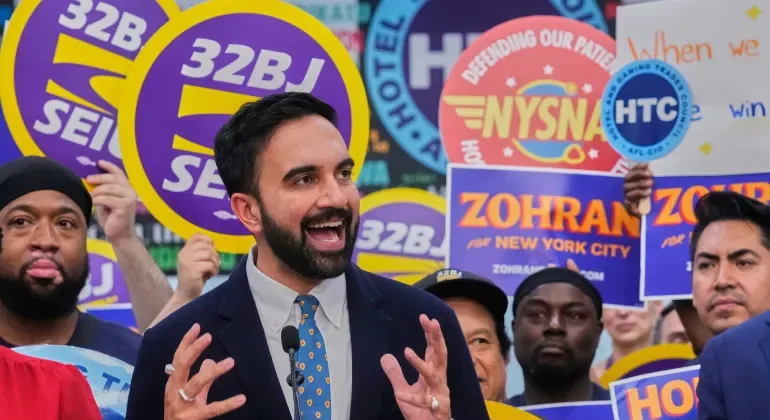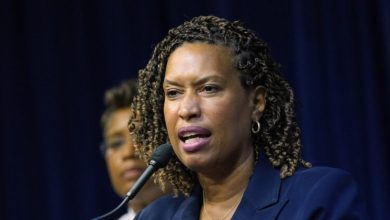Critics Point to Foreign Lobby

Democratic establishment faces backlash for refusing to support party’s mayoral nominee despite “blue no matter who” tradition
Three prominent Democratic leaders are facing mounting criticism for their refusal to endorse Zohran Mamdani, who decisively won New York City’s Democratic mayoral primary last month, with critics pointing to the influence of pro-Israel lobbying groups as the driving factor behind the unprecedented break from party unity.
House Minority Leader Hakeem Jeffries, Senator Cory Booker, and CNN commentator Bakari Sellers have all declined to support Mamdani, the 33-year-old democratic socialist assemblyman who defeated former Governor Andrew Cuomo and other establishment candidates by substantial margins in June’s primary.
The refusal to endorse represents a stark departure from the Democratic Party’s traditional “blue no matter who” approach, particularly striking given that Mamdani won Jeffries’ own Brooklyn district by double digits.
Jeffries Draws Fire for “Gutless” Response
During a recent CNBC “Squawk Box” interview, Jeffries sidestepped questions about Mamdani’s progressive policy platform, which includes rent freezes, universal public transportation, and free supermarkets. Instead, the minority leader suggested Mamdani must “demonstrate to a broader electorate” that his proposals are viable.
The comments drew sharp criticism from progressive activists and political observers. Amanda Litman, co-founder of Run For Something, called Jeffries’ stance damaging to Democratic credibility.
“He won the primary! Handily!! Does that electorate not count? Do those voters not matter?” Litman posted on social media, adding that such behavior “does more to undermine faith in the institution of the Democratic Party than anything Mamdani might ever say or do.”
Author Roxane Gay described Jeffries as “gutless,” noting that as an “establishment Democrat,” his opposition to progressive candidates follows a predictable pattern.
AIPAC Influence Under Scrutiny
Critics increasingly point to the American Israel Public Affairs Committee’s influence over the three Democrats as the primary explanation for their opposition to Mamdani, a vocal supporter of Palestinian liberation who has criticized Israel’s military actions in Gaza.
According to AIPAC Tracker, the pro-Israel lobbying group is Jeffries’ all-time top campaign donor. The minority leader has particularly criticized Mamdani’s use of phrases like “globalize the intifada,” which supporters describe as calls for universal justice.
Similarly, Booker has received substantial AIPAC support throughout his Senate career, while Sellers maintains close ties to pro-Israel organizations through his media and consulting work.
Booker Deflects Direct Questions
In a recent CNN interview with Manu Raju, Booker repeatedly avoided answering whether he supports Mamdani, instead offering vague statements about unity and focusing on New Jersey politics.
“Let New York politics be New York politics,” Booker said when pressed. “We’ve got enough challenges in Jersey. You guys figure out your elections.”
The senator also used the interview to attack supporters of police reform, stating that “anybody who’s saying ‘defund the police’ is wrong” and promising to “always fight that” within the Democratic Party.

Despite the controversy over his positions on Israel-Palestine, recent polling shows Mamdani enjoys strong support among New York’s Jewish voters, who prefer him over other mayoral candidates by double-digit margins.
The disconnect between Jewish voter preferences and the positions taken by prominent Jewish Democratic leaders has added another layer of complexity to the endorsement controversy.
Electoral Implications
Mamdani’s primary victory shocked the political establishment, particularly given his defeat of Cuomo, who was expected to easily reclaim the mayor’s office. The assemblyman’s success was driven by strong support in working-class neighborhoods and among young voters frustrated with traditional Democratic leadership.
The refusal of party leaders to endorse their own nominee could complicate Democratic unity efforts ahead of the general election, though Mamdani maintains significant grassroots support and financial backing from progressive organizations nationwide.
Obama’s Strategic Outreach
Adding complexity to the establishment’s response, former President Barack Obama reportedly called Mamdani shortly after his primary victory to discuss “the importance of hope in our politics” and campaign strategy. The call, first reported by The New York Times, suggests Obama may be positioning himself differently than current Democratic leaders.
Black American Political scientist Jamarlin Martin, author of “Science vs Spook- BPSC 101: 50 Lessons in Black American Political Science,” sees broader implications in the party’s divided response.
“There is an insurgency within the Democratic Party sparked by the energy and hope of Mamdani,” Martin explained. “The establishment is defending and leaders like Obama are hedging just in case the insurgency becomes a broader movement against the DNC establishment. Obama has materially more flexible political capital than Booker, Jeffries, and Sellers. They are severely restricted on what they can say or do that conflicts with their financial donors and those who heavily invested in their political careers.”
City College professor Angus Johnston noted the long-term implications, suggesting that if party leaders eventually do endorse Mamdani, “the only response available to Mamdani next year if someone asks him whether he’s endorsing Jeffries is three seconds of incredulous laughter.”




